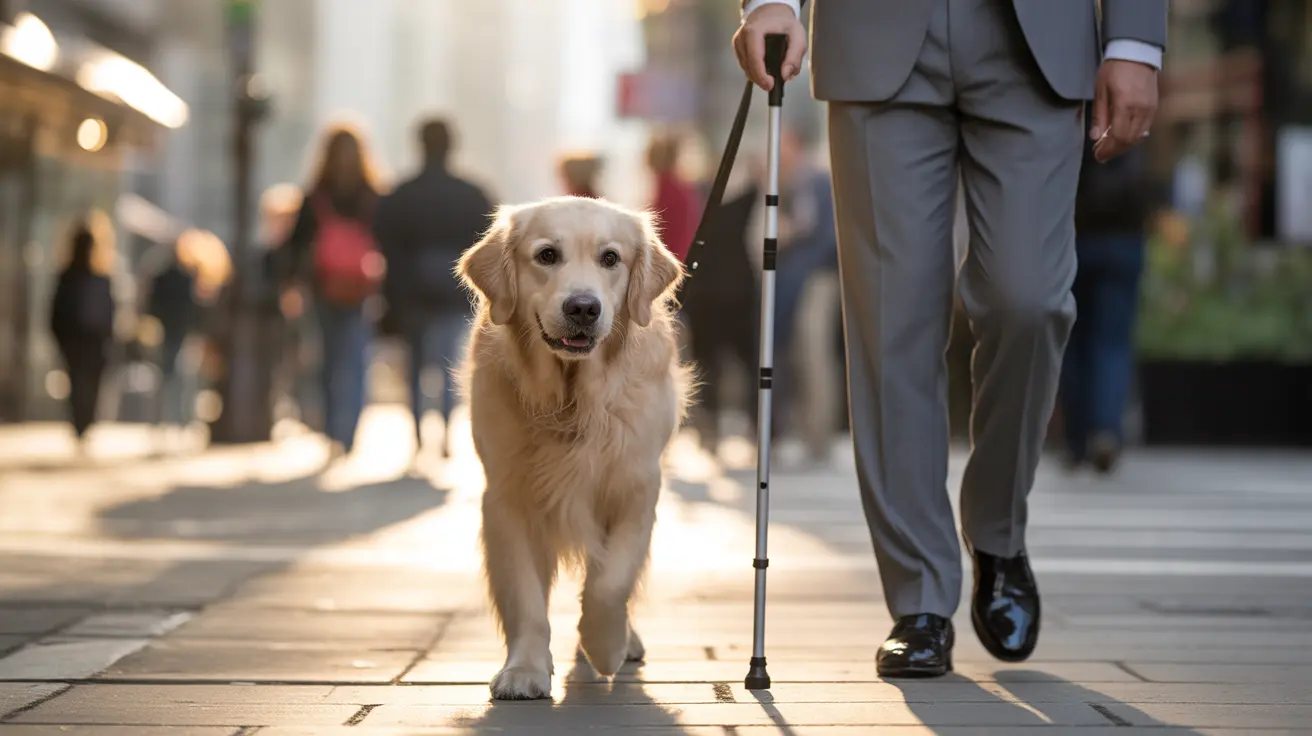Service dogs are remarkable animals that provide essential support to people with disabilities, helping them lead more independent and fulfilling lives. These highly trained companions are specifically taught to perform various tasks that directly assist their handlers with different physical, mental, or medical challenges. Let's explore the five main types of service dogs and understand their unique roles in supporting individuals with disabilities.
Guide Dogs: Leading the Way
Guide dogs are perhaps the most widely recognized type of service dog. These intelligent canines are specially trained to help individuals who are blind or visually impaired navigate their environment safely. They master complex skills such as:
- Avoiding obstacles and hazards
- Stopping at curbs and stairs
- Finding doors, elevators, and specific locations
- Practicing "intelligent disobedience" when commands could lead to danger
These dogs undergo extensive training from puppyhood, typically working with specialized organizations that have decades of experience in guide dog training.
Hearing Dogs: Alert and Aware
Hearing dogs serve as the ears for individuals who are deaf or hard of hearing. These attentive companions are trained to respond to various sounds and alert their handlers through physical contact. They recognize and respond to:
- Doorbells and knocking
- Fire alarms and smoke detectors
- Ringing phones
- Baby cries
- Approaching vehicles
Mobility Assistance Dogs: Providing Physical Support
Mobility assistance dogs help individuals with physical disabilities maintain their independence. These strong and steady companions are trained to:
- Retrieve dropped items
- Open and close doors
- Provide balance support
- Help with dressing and undressing
- Support wheelchair users
- Assist with transfers between surfaces
Medical Alert Dogs: Life-Saving Detection
Medical alert dogs are trained to detect and respond to various health conditions and medical emergencies. These remarkable animals can:
- Detect changes in blood sugar levels for diabetics
- Predict seizures before they occur
- Alert to dangerous blood pressure changes
- Recognize severe allergic reactions
- Summon help during medical emergencies
Psychiatric Service Dogs: Mental Health Support
Psychiatric service dogs assist individuals with mental health conditions such as PTSD, anxiety, and depression. These empathetic companions provide crucial support by:
- Interrupting anxiety attacks
- Providing deep pressure therapy
- Creating personal space in crowded areas
- Reminding handlers to take medication
- Offering grounding during dissociative episodes
Frequently Asked Questions
What are the main differences between guide dogs, hearing dogs, and mobility assistance dogs?
Guide dogs focus on navigation and obstacle avoidance for visually impaired individuals, hearing dogs alert to important sounds for deaf or hard-of-hearing people, and mobility assistance dogs provide physical support and help with tasks requiring dexterity or strength.
How do medical alert and psychiatric service dogs help their handlers in daily life?
Medical alert dogs detect and respond to health emergencies like seizures or blood sugar changes, while psychiatric service dogs help manage mental health symptoms through specific tasks like interrupting anxiety attacks or providing grounding during dissociative episodes.
What training is required for a dog to become a certified service dog?
Service dogs undergo 1-2 years of intensive training, learning at least three specific tasks related to their handler's disability. Training includes public access skills, task-specific training, and handler-specific customization.
Can any dog breed be trained as a service dog, or are certain breeds better suited?
While any breed can potentially become a service dog, certain breeds are more commonly chosen due to their size, intelligence, and temperament. Popular breeds include Labrador Retrievers, Golden Retrievers, German Shepherds, and Standard Poodles.
What legal rights do service dog handlers have under the Americans with Disabilities Act (ADA)?
Under the ADA, service dog handlers have the right to bring their dogs into all public spaces, including restaurants, stores, and housing. Businesses cannot charge extra fees or deny access to service dog teams, though the dogs must be under control and house-trained.
Understanding these different types of service dogs highlights the incredible impact these animals have on the lives of people with disabilities. Through their specialized training and dedication, service dogs continue to break down barriers and provide essential support to their handlers, enabling greater independence and improved quality of life.






